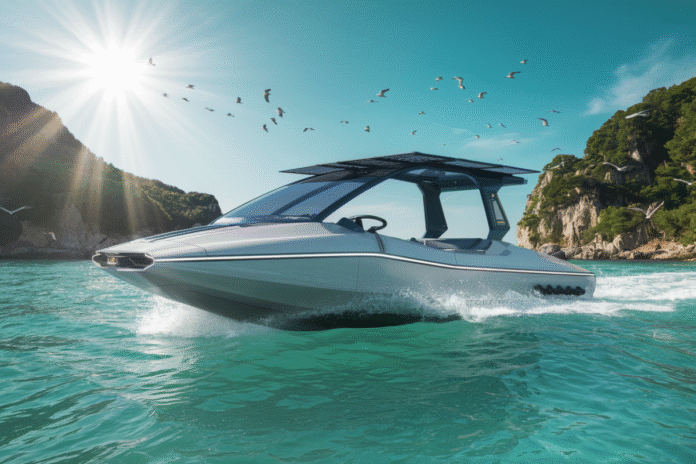“Just a few months ago, it seemed the end was near for a company that aimed to revolutionize the powersport industry.” The Canadian all-electric powersport manufacturer faced significant challenges that put its future in jeopardy. As the market for electric vehicles expands, the competition intensifies, leaving many companies struggling to stay afloat. Taiga, however, has not only overcome these hurdles but is also making a triumphant return to the spotlight with the launch of a new personal watercraft (PWC) model. This development raises questions about the sustainability of electric powersports and whether Taiga can carve out a niche in a rapidly evolving market.
The stakes are high for Taiga as it reenters the scene. The powersport industry is undergoing a transformation, with consumers increasingly seeking eco-friendly alternatives. However, the high costs associated with electric vehicles pose a barrier to widespread adoption. Taiga’s new PWC model is expected to be on the pricier side, highlighting the ongoing tension between innovation and affordability. As the company attempts to gain traction, it must navigate not only market dynamics but also consumer perceptions. Will Taiga’s latest offering resonate with buyers, or will it struggle to find its place in a competitive landscape?
Reviving a Vision: Taiga’s Return to Production
After facing financial difficulties that nearly led to its demise, Taiga has successfully resumed production, signaling a renewed commitment to its vision of sustainable powersports. The company’s journey has been marked by challenges, including supply chain disruptions and the inherent risks associated with developing new technologies. Despite these obstacles, Taiga has managed to pivot and refocus its efforts, showcasing resilience in a demanding market.
The decision to restart production comes at a crucial time when the demand for electric vehicles is surging. According to recent statistics, the global electric vehicle market is projected to grow significantly over the next decade, driven by increasing environmental awareness and government incentives. Taiga’s return aligns with this trend, positioning the company to capitalize on the growing interest in eco-friendly alternatives. While the path to recovery is fraught with uncertainty, Taiga’s determination to innovate and lead in the electric powersport sector is commendable.
However, the revival of production does not guarantee success. Taiga must contend with established competitors who have already carved out substantial market shares. The company’s ability to differentiate itself through innovative technology and appealing designs will be critical. By focusing on quality and performance, Taiga aims to attract environmentally conscious consumers who are willing to invest in premium electric powersport vehicles.
The Launch of a New Personal Watercraft Model
As part of its resurgence, Taiga is set to unveil a new personal watercraft model that promises to deliver an exhilarating riding experience while remaining environmentally friendly. This model represents the culmination of extensive research and development, showcasing the latest advancements in electric propulsion technology. The company aims to redefine the standards of performance in the PWC market, challenging traditional gas-powered models.
While specific pricing details have not been disclosed, early indications suggest that Taiga’s new PWC will be positioned at the higher end of the market. This pricing strategy reflects the premium nature of the product, as well as the costs associated with developing cutting-edge electric technology. The decision to launch a high-end model may attract affluent consumers looking for luxury and sustainability, but it also risks alienating price-sensitive buyers.
The implications of this launch extend beyond mere market competition. By introducing a high-performance electric PWC, Taiga is not only showcasing its engineering capabilities but also sending a message about the future of recreational watercraft. If successful, this model could pave the way for broader acceptance of electric powersports and inspire other manufacturers to invest in similar technologies.
Navigating the Challenges of the Electric Powersport Market
The electric powersport market is fraught with challenges that Taiga must address to ensure its long-term viability. Chief among these challenges is consumer perception. Many potential buyers remain skeptical about the performance and reliability of electric vehicles, particularly in high-demand recreational settings. Taiga needs to effectively communicate the advantages of its electric PWC, emphasizing not only its environmental benefits but also its performance capabilities.
Another significant hurdle is the infrastructure necessary to support electric powersports. Charging stations and maintenance services for electric vehicles are still limited in many regions, posing a challenge for potential buyers. Taiga’s success may depend on its ability to collaborate with stakeholders to enhance the charging network and ensure that customers have access to the resources they need to enjoy their electric PWCs fully.
Furthermore, the competitive landscape is constantly evolving, with new entrants emerging and established players ramping up their electric offerings. Taiga must remain agile and innovative, continually refining its products and marketing strategies to stay ahead of the curve. By focusing on research and development, the company can ensure that it meets the changing demands of consumers while solidifying its position in the market.
A Future of Possibilities for Taiga and Electric Powersports
Taiga’s journey from the brink of collapse to a promising future in the electric powersport market highlights the potential for innovation in this sector. As the company prepares to launch its new PWC model, it stands at a crossroads, ready to make a significant impact on the industry. The success of this venture could serve as a catalyst for further advancements in electric powersports, encouraging other manufacturers to follow suit.
Moreover, the growing emphasis on sustainability in consumer choices is likely to benefit companies like Taiga that prioritize eco-friendly technologies. As environmental concerns continue to shape consumer preferences, electric powersports may become increasingly mainstream. Taiga’s commitment to producing high-quality, sustainable products aligns with this trend, positioning the company to capture a share of the expanding market.
Looking ahead, Taiga’s ability to navigate the challenges of the electric powersport landscape will be crucial. By focusing on innovation, consumer education, and strategic partnerships, the company can build a strong foundation for future growth. The electric powersport industry is evolving, and Taiga is poised to play a pivotal role in shaping its future.


